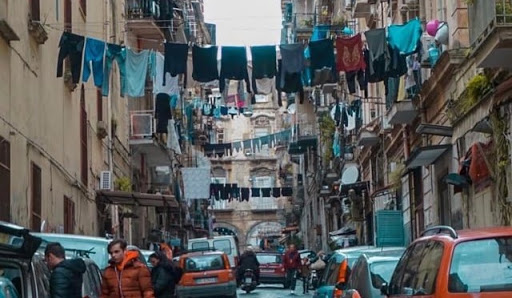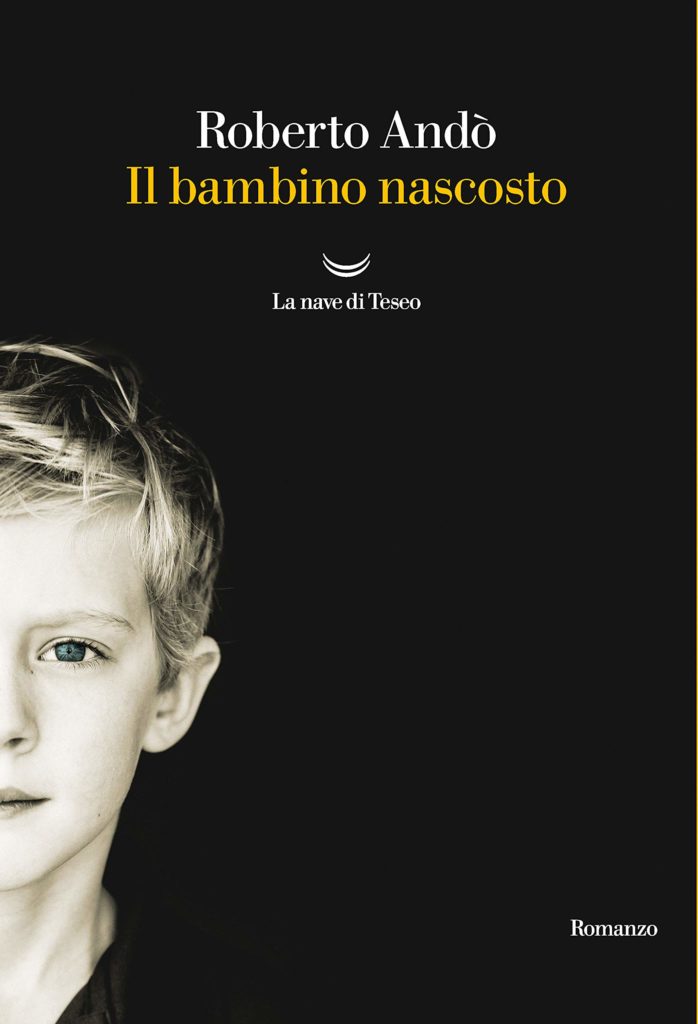Lo confesso! Gabriele Santoro é il mio vicino di casa ideale. La sua immensa cultura e la profondità del suo pensiero mi affascinano. Certo è un uomo schivo, sfuggente, con cui é difficile scambiare quattro chiacchiere. Sicuramente incontrandomi per le scale mi saluterebbe con un lieve cenno del capo e proseguirebbe per la sua strada, riservato e solitario com’è. Io però non mi arrenderei al primo ostacolo: il mio desiderio di conversare con lui é troppo forte. Dal suo appartamento a volte arriva attutito il suono del pianoforte. Si riconoscono spesso le note del settimo brano delle Kinderszenen di Schumann, Traumerei, o uno dei Douze Études pour piano di Debussy.
È più frequente sentirlo al mattino declamare a memoria un canto dell’Eneide o dell’Orlando furioso mentre in bagno, davanti allo specchio, si appresta a radersi. Se gliene chiedessi il motivo, magari un po’ infastidito dalla mia invadenza, mi risponderebbe sbrigativo che lo fa per gli effetti benefici che una mente ben allenata può avere sull’umore.
Gabriele Santoro, però, ha colpe inconfessate da espiare, come sospetta suo padre Massimo, e ha scelto per sé vicini di casa discutibili. Per una forma irragionevole di autolesionismo ha voluto frapporre una distanza incolmabile tra le sue origini borghesi e la nuova vita, scegliendo di trasferirsi in uno dei quartieri più difficili di Napoli, Forcella, influenzato probabilmente da “Il mare non bagna Napoli” di Anna Maria Ortese.

Crede che il guscio di riservatezza e solitudine in cui si é rinchiuso lo protegga dai tentacoli della malavita che lo circonda, ma una metastasi sfugge al suo controllo e si insinua nella sua casa e nella sua vita con le sembianze di un bambino di dieci anni dagli occhi azzurri e i capelli neri.
Ciro Acerno, resosi colpevole di un delitto troppo grande per la sua tenera età, “un mattino putulente di fine estate”, si rifugia nell’appartamento del maestro di musica, certo che quell’estraneo silenzioso e gentile, che incontra ogni tanto per le scale, potrà salvarlo dalla sete di vendetta del boss del quartiere più di quanto sarebbero in grado di fare i suoi stessi genitori.

Gabriele non si tira indietro e dà l’avvio così all’avvincente storia che Roberto Andò ci racconta nel suo ultimo romanzo dal titolo Il bambino nascosto, pubblicato da La nave di Teseo.
Sullo sfondo della storia una Napoli bellissima e perduta mostra al lettore tutte le sue facce contraddittorie.
Quella del poliziotto che, refrattario a qualsiasi forma di pudore, abbraccia camorristi nel suo stesso commissariato.
Quella del magistrato pavido che, trincerandosi dietro una legge che non prevede coinvolgimenti affettivi, evita di mettere a rischio il proprio avanzamento di carriera.
Quella del maestro di pianoforte del conservatorio di Napoli, Gabriele Santoro, che non esita per un solo istante a mettere in pericolo la propria vita pur di salvare quella del suo piccolo ospite, verso il quale prova sin da subito un affetto e un istinto di protezione commoventi.
Un romanzo che ci immerge in un’atmosfera tensiva degna dei migliori thriller americani, e non dà tregua a chi prova ad interromperne, anche solo per poco, la lettura, inframmezzando ai numerosi colpi di scena i dolci e malinconici versi di Kavafis.
Roberto Andò’s hidden child
I confess it! Gabriele Santoro is my ideal neighbor. His immense culture and the depth of thought about him fascinate me. Of course, he is a shy, elusive man, with whom it is difficult to chat. Surely, meeting me on the stairs, he would greet me with a slight nod and continue his way, reserved and solitary as he is. But I would not give up on the first obstacle: my desire to converse with him is too strong. Sometimes the sound of the piano comes from his apartment. We often recognize the notes of the seventh piece of Schumann’s Kinderszenen, Traumerei, or one of Debussy’s Douze Études pour piano.
It is more common to hear him recite from memory a song from the Aeneid or Orlando Furioso in the morning while in the bathroom, in front of the mirror, he is preparing to shave. If I asked him why, perhaps a little annoyed by my intrusiveness, he would reply hastily that he does it for the beneficial effects that a well-trained mind can have on mood.
Gabriele Santoro, however, has unacknowledged sins to atone, as his father Massimo suspects, and has chosen questionable neighbors for himself. For an unreasonable form of self-harm, he wanted to interpose an unbridgeable distance between his bourgeois origins and his new life, choosing to move to one of the most difficult neighborhoods in Naples, Forcella, probably influenced by Anna Maria Ortese’s “Il mare non bagna Napoli”.
He believes the shell of secrecy and loneliness he is locked up in, protects him from the tentacles of the underworld that surrounds him. But a metastasis escapes his control and creeps into his home and life in the guise of a ten-year-old, with blue eyes and black hair.
Ciro Acerno was found guilty of a crime too great for his tender age, “a petulant morning at the end of summer”. He takes refuge in the apartment of the music teacher. He was certain that that silent and kind stranger, whom he meets every now and then for the stairs, can save him from the neighborhood boss’s thirst for revenge more than his own parents would be able to.
Gabriele does not hold back and thus begins the exciting story that Roberto Andò tells us in his latest novel entitled The hidden child, published by La nave di Teseo.
Against the background of history, a beautiful and lost Naples shows the reader all its contradictory faces.
That of the policeman who, tough to any form of modesty, embraces the Camorra in his own police station.
That of the fearful magistrate who avoids putting his career advancement at risk, by hiding behind a law that does not provide for emotional involvement.
That of the piano teacher of Naples conservatory, Gabriele Santoro. He does not hesitate for a single moment to put his life in danger just to save that of his little guest, towards whom he immediately feels an affection and an instinct for protection moving.
A novel that immerses us in a tense atmosphere worthy of the best American thrillers. It gives no respite to those who try to interrupt their reading, even if only for a short time, interspersing the many twists with Kavafis’ sweet and melancholy verses.
Traduzione in lingua inglese a cura di Dario D’Andrea, studente dell’Università di Macerata e tirocinante presso la biblioteca.




